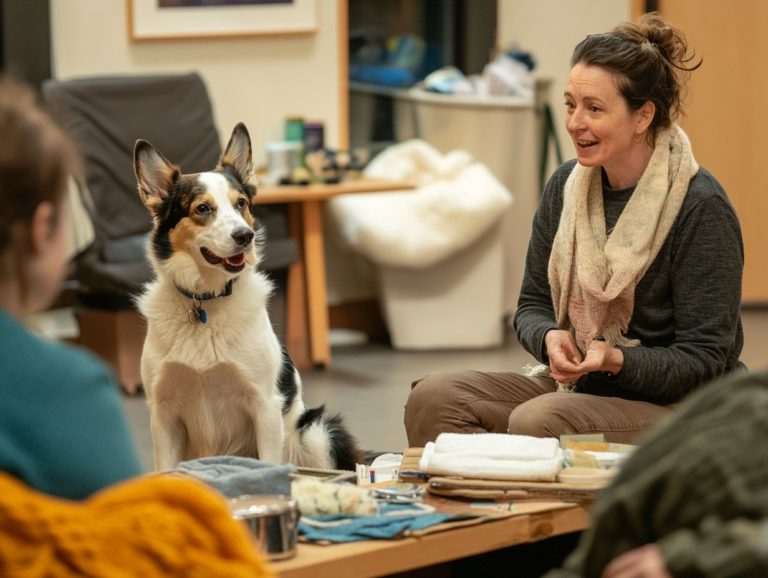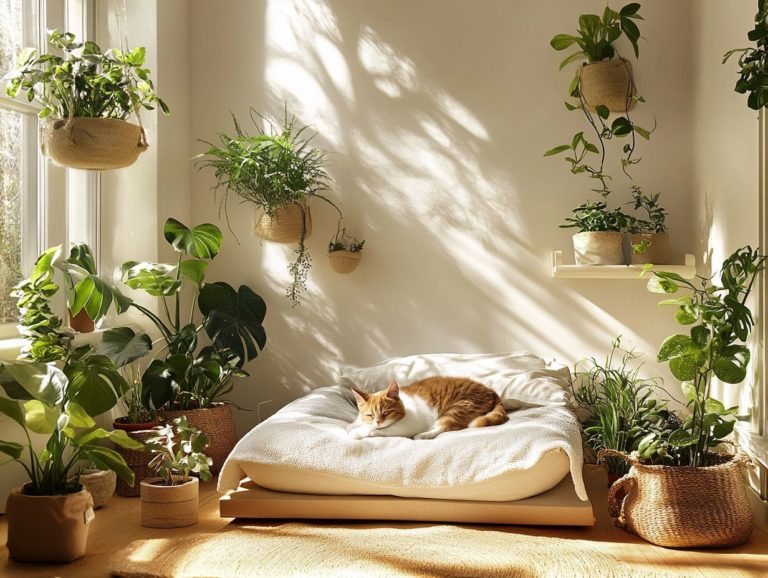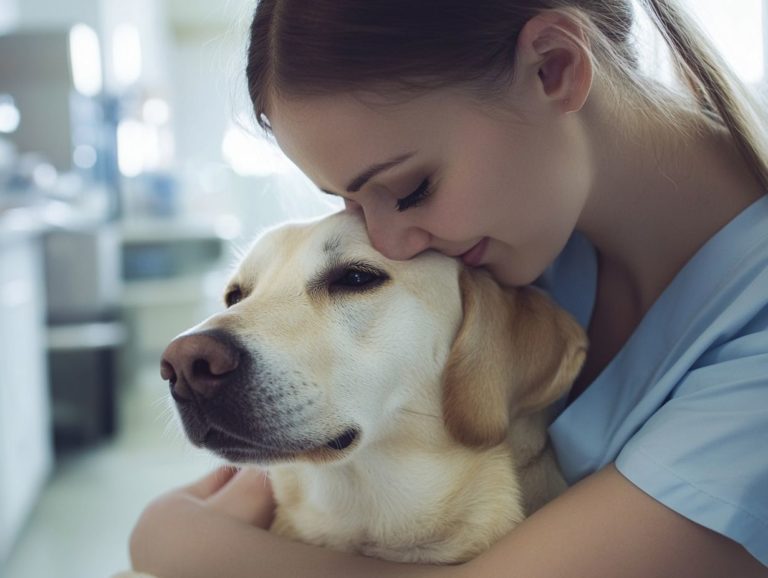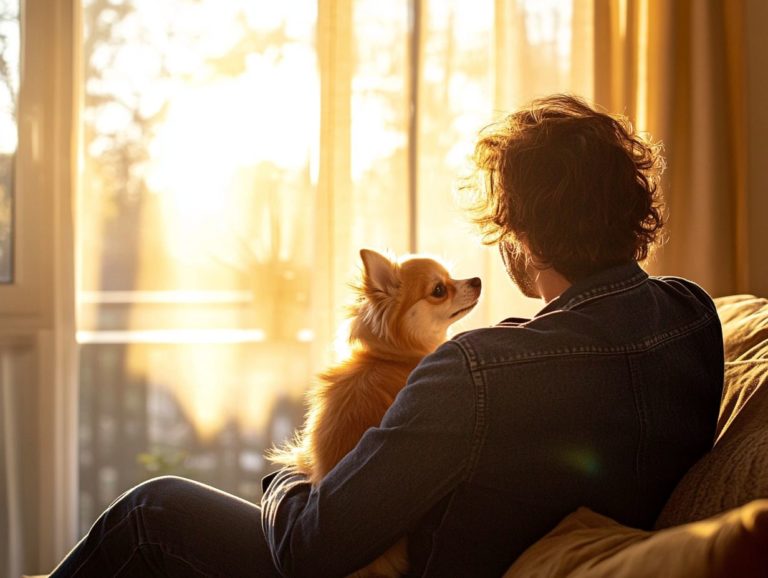How Can Routine Help Anxious Pets?
Anxiety in pets can be distressing, not just for the animals but for you as well. It often leads to unwanted behaviors and strained relationships. Establishing a consistent routine can serve as a powerful antidote to alleviate anxiety for your furry companions.
This article delves into the nature of anxiety in pets, highlighting the crucial role of routine and offering practical steps to foster a nurturing environment. From implementing a daily schedule to incorporating enriching activities, you’ll discover strategies that not only calm anxious pets but also strengthen your bond with them.
Join us as you explore the numerous benefits of routine and learn when it may be time to seek professional assistance.
Contents
- Key Takeaways:
- The Impact of Routine on Anxious Pets
- Creating a Routine for Your Pet
- Tools and Techniques for Managing Anxiety
- Calming Products and Strategies
- Seeking Professional Help
- Benefits of a Routine for Anxious Pets
- Frequently Asked Questions
- How can routine help anxious pets?
- What are some ways to establish a routine for an anxious pet?
- Can a routine help with separation anxiety in pets?
- Will incorporating physical exercise into a routine benefit anxious pets?
- Can a routine help anxious pets with behavioral issues?
- Is it important to stick to a routine for anxious pets?
Key Takeaways:
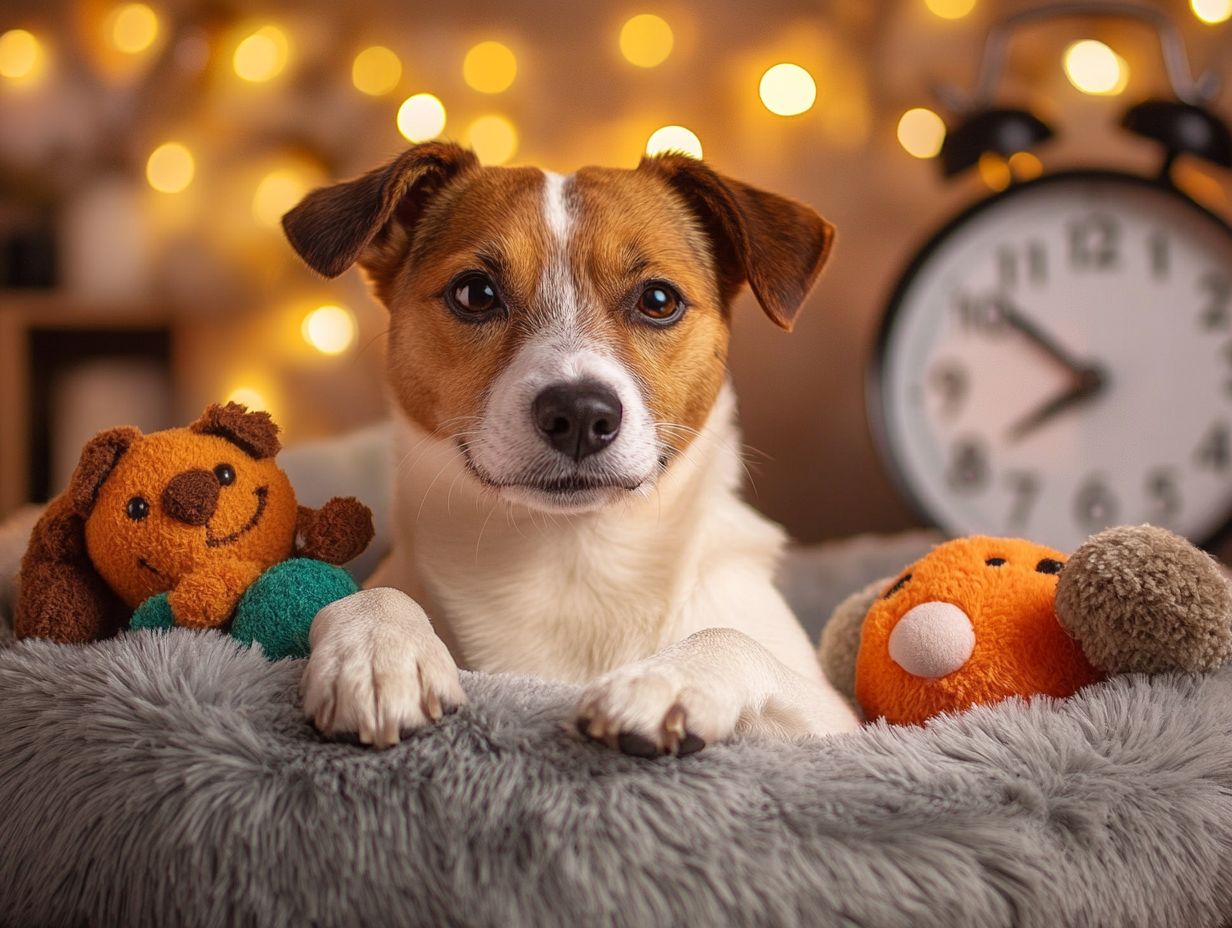
- A consistent routine can help alleviate anxiety in pets by providing a sense of structure and security.
- Establishing a schedule and incorporating enrichment activities can keep anxious pets occupied and stimulated, promoting overall well-being.
- In cases of severe anxiety, seeking professional help from a veterinarian or behaviorist can greatly benefit both the pet and their owner.
The Impact of Routine on Anxious Pets
Establishing a consistent routine for your dog, especially if they are anxious or struggle with separation anxiety, is essential for nurturing a sense of safety and stability. For more tips on encouraging calm behavior in anxious pets, a well-structured routine not only helps manage their stress levels but also boosts their overall behavior and emotional well-being.
Think of routine as a series of daily practices: training sessions, grooming, and exercise. Each of these elements can profoundly impact your pet s mental health. With a well-structured schedule, you ll gain a deeper understanding of your dog’s needs, ensuring they feel secure in their environment.
Understanding Anxiety in Pets
Getting to know your dog s feelings can be a game-changer! Understanding anxiety in pets, especially dogs, is crucial for addressing their behavioral issues with both effectiveness and compassion. You may notice common signs of anxiety, such as excessive barking, destructive behaviors, and stress indicators like pacing or hiding.
Taking a closer look at various types of anxiety like separation anxiety, which often surfaces when a dog is left alone, or noise phobias triggered by loud sounds such as thunder or fireworks reveals the intricate emotional challenges your dog may face. Recognizing these behavioral signs can significantly help you identify the specific triggers behind your dog’s distress.
By meeting these needs with tailored training methods, such as using positive experiences during stressful situations and creating a comforting safe space, you can dramatically enhance your dog s overall well-being.
Nurturing that connection leads to better management strategies, allowing both you and your pet to thrive together.
Why Routine is Important for Anxious Pets
Routine plays a crucial role in the lives of anxious dogs, giving them the structure and predictability they crave to feel secure. By understanding the benefits of consistency in training anxious pets, you can significantly lower your pet’s anxiety levels, paving the way for improved behavior and emotional health.
A well-structured routine fosters bonding between you and your dog and teaches essential skills through training and socialization. This kind of predictability helps your dog build confidence while reducing stress.
Incorporating regular exercise, like daily walks or play sessions, allows your dog to expend excess energy while enjoying the mental stimulation that comes from being outdoors. Feeding times can also be cornerstones of this routine, offering your dog a sense of reliability throughout their day.
Dedicated training sessions enhance trust and communication, further strengthening the emotional bond you share with your pet.
Together, these elements contribute to a more balanced and relaxed demeanor, enhancing overall mental health and providing a reassuring foundation for anxious dogs.
Start implementing these strategies today to help your pet feel more secure!
Creating a Routine for Your Pet
Creating a routine for your dog requires thoughtful consideration. Craft a daily schedule that includes important activities like exercise, training, and socializing. A well-structured routine does more than just manage anxiety; it nurtures a strong sense of companionship and trust between you and your pet.
Giving your dog a safe haven during stressful moments is vital. It supports their emotional well-being. By integrating enrichment activities and consistent training practices into this routine, you can enhance your dog’s happiness and health.
Establishing a Schedule
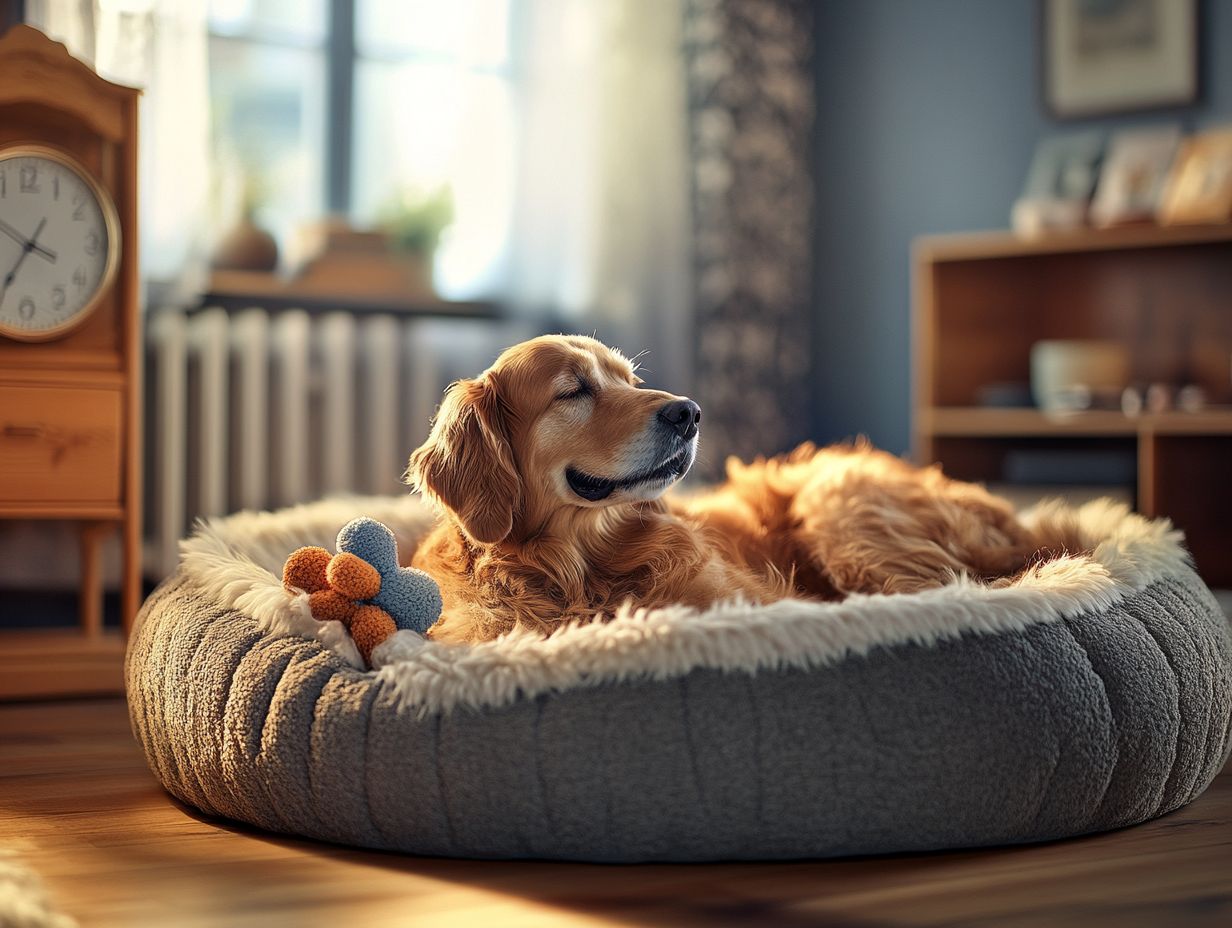
Establishing a well-defined schedule for your dog is crucial for creating an effective routine that meets their needs and helps ease anxiety. A comprehensive daily plan should include specific times for exercise, training, grooming, and relaxation, allowing your dog to anticipate their day and feel more secure.
By making necessary adjustments to the schedule based on your dog’s preferences and behavior, you can enhance your bond and provide them with a sense of control over their environment.
Incorporating playtime into this routine not only promotes physical health but also nurtures emotional well-being. Daily training sessions can vary in duration and type, tailored to your dog’s energy levels and learning pace, thus reinforcing good behavior and deepening your connection.
While consistency is vital for your dog’s learning and comfort, being adaptable helps you respond to your dog’s mood or energy changes. This balance between structure and flexibility is essential for cultivating a fulfilling relationship, ensuring your dog feels understood and loved.
Incorporating Enrichment Activities
Incorporating enrichment activities into your dog’s routine is essential for promoting their mental health and overall well-being. Engaging your dog in enjoyable activities like puzzle toys, interactive games, and socializing does more than just alleviate anxiety; it also stimulates their cognitive abilities.
Regularly introducing new challenges keeps boredom at bay and prevents your dog from getting into trouble! Consider activities such as scent work, where your dog can utilize their incredible sense of smell to find hidden treats, or agility courses that test their physical skills and coordination.
Playdates with other dogs provide invaluable social interactions that build confidence and improve play behavior. Mixing basic obedience training with fun tricks taps into their intelligence while reinforcing positive actions.
Don t underestimate the power of variety in toys chew toys can be fantastic for both mental stimulation and dental health. By diversifying these experiences, you can significantly enhance your dog’s happiness and well-being, nurturing a healthier, more fulfilled canine companion.
Tools and Techniques for Managing Anxiety
Managing anxiety in dogs calls for a careful mix of effective tools and techniques designed specifically for their unique needs. Explore calming products like ThunderCloud or Adaptil, pairing them with training methods that help change your dog’s behavior to foster a greater sense of ease in your pet.
By implementing consistent training and supportive techniques, you ll enable your dog to navigate anxiety triggers more effectively, ultimately enhancing their emotional health and stability.
Don’t wait! Start implementing these strategies today for a happier, healthier dog!
Calming Products and Strategies
Calming products like Adaptil and Rescue Remedy are a game-changer for your dog’s anxiety! Pairing these products with strategies such as music therapy or calming coats can create a soothing atmosphere that helps your pet feel more settled during stressful times.
By weaving these calming aids into your dog’s routine, you can significantly enhance their emotional stability and reduce signs of anxiety.
Have you noticed how specific scents or sounds can profoundly affect your furry friend’s demeanor? Using aromatherapy diffusers with lavender or chamomile can promote tranquility, while soft, melodic music can envelop the space in calmness.
Regular exercise through daily walks not only helps release pent-up energy but also boosts overall well-being. Introducing interactive toys allows your pet to focus and redirect their anxious energy, offering a holistic approach to managing stress.
This multifaceted strategy ensures your dog’s unique needs are met, fostering a sense of safety and comfort in their environment.
Seeking Professional Help
When managing anxiety in dogs, seeking professional assistance from a veterinary behaviorist a professional who helps with dog behavior issues or a trainer is vital for effective treatment and support. These experts provide customized techniques and training strategies targeting the behavioral issues your dog may face.
Understanding the signs and triggers of anxiety, including common symptoms in puppies and senior dogs, can help you identify the right treatment quickly. Ensuring both you and your pet achieve optimal outcomes is essential!
When to Consult a Veterinarian or Behaviorist
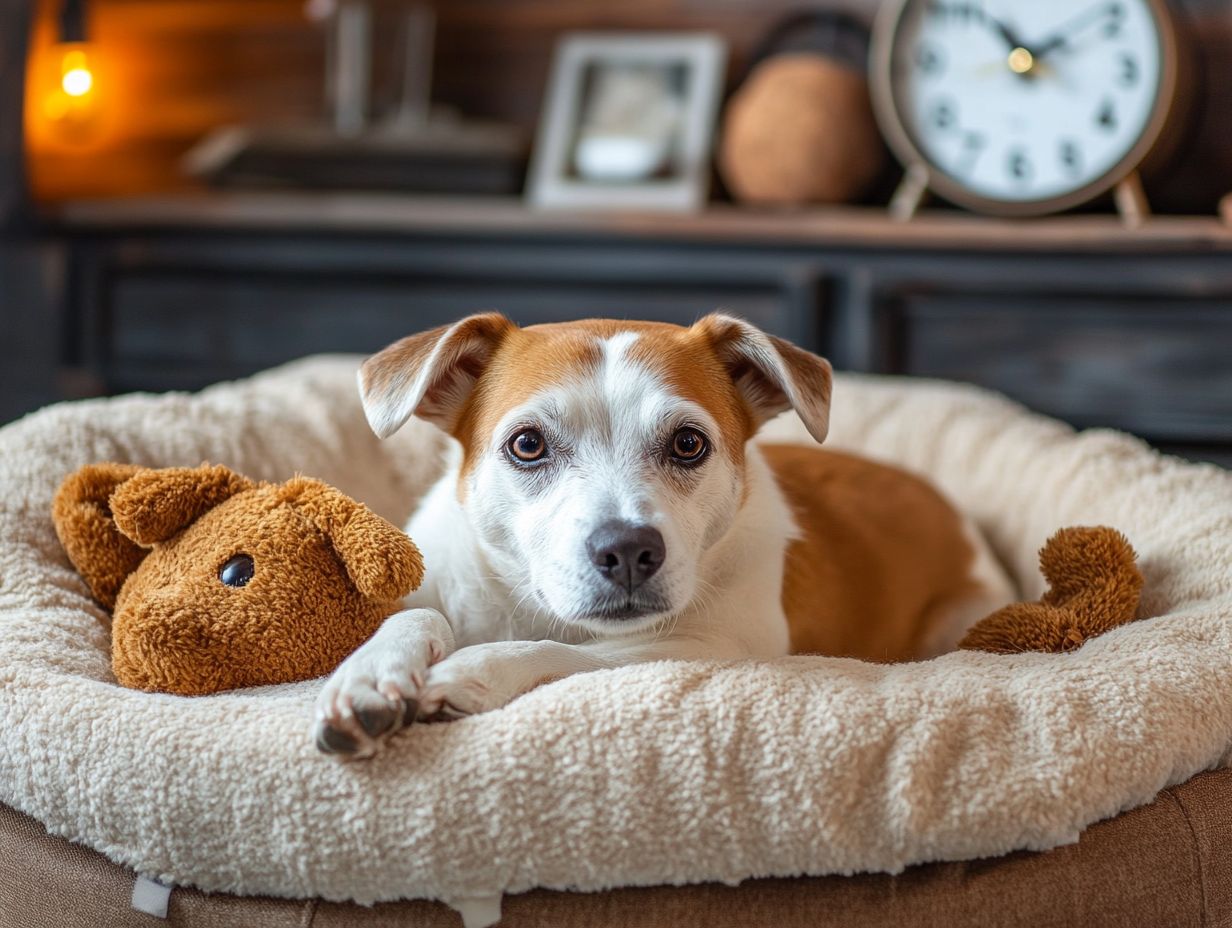
Recognizing when to consult a veterinarian or behaviorist for your anxious dog is essential for ensuring your dog gets the help they need fast! If your dog shows persistent signs of anxiety like excessive barking, destructive behavior, or withdrawal don’t wait! Professional support can be invaluable in addressing these challenges.
Be vigilant for additional signs such as panting, pacing, or an increased heart rate. These may indicate underlying emotional stress. Seeking professional assistance not only facilitates an accurate diagnosis but also expands your options for treatment, including behavioral therapy, training techniques, grooming, and even medication if necessary.
Veterinarians can offer insights into physical health aspects contributing to your dog s anxiety, while behaviorists specialize in creating tailored behavior modification plans. These plans may include calming techniques and enrichment activities. Together, they can guide you toward holistic solutions promoting emotional well-being, ensuring a healthier and happier life for your beloved companion.
Benefits of a Routine for Anxious Pets
Establishing a routine for anxious dogs offers countless benefits that significantly enhance their well-being and strengthen the bond between pets and their owners. For more insights, check out how to create a routine for anxious pets.
A well-defined routine creates predictability and stability, helping reduce anxiety and allowing dogs to feel secure in their environment. Incorporating elements such as exercise and toys can further enhance this structure.
With consistent routines, you ll notice improved behavior, as dogs learn what to expect and cultivate a sense of confidence in their daily activities.
Improved Behavior and Well-being
One of the most significant benefits of establishing a routine for your dog is the noticeable improvement in their behavior and overall well-being. Consistent training and daily practices can alleviate anxiety and foster better mental health. Dogs that engage in structured activities are often less prone to destructive behaviors, creating a more harmonious household.
Incorporating regular walks, feeding times, and play sessions into your daily life instills a sense of security that’s crucial for emotional stability. By engaging in training sessions that reinforce good behavior and practicing commands, you can witness a remarkable decline in issues like excessive barking and separation anxiety.
Routines help your dog feel more at ease in their environment, allowing them to adapt more comfortably to changes. Over time, this leads to better socialization skills and a more balanced temperament, ultimately transforming both your dog’s life and the dynamic of your household. This also includes managing distractions and fostering calming practices.
Building a Stronger Bond with Your Pet
Creating a stronger bond with your dog is incredibly rewarding! Establishing a routine can significantly enhance this companionship. When you engage in regular walks, playtime, or training exercises, these shared experiences not only provide essential physical activity but also foster a sense of unity and emotional support for your pets.
For instance, practicing commands and rewarding good behavior reinforces the trust between you and your furry friend, nurturing a relationship founded on respect and understanding. A predictable schedule can also help alleviate anxiety in dogs, making them feel more secure and deepening your emotional connection through bonding activities.
As these routines become ingrained, mutual affection flourishes. Daily rituals transform into cherished bonding moments that both you and your dog look forward to. Incorporating games like fetch and using toys can also enhance their enrichment.
Frequently Asked Questions
How can routine help anxious pets?
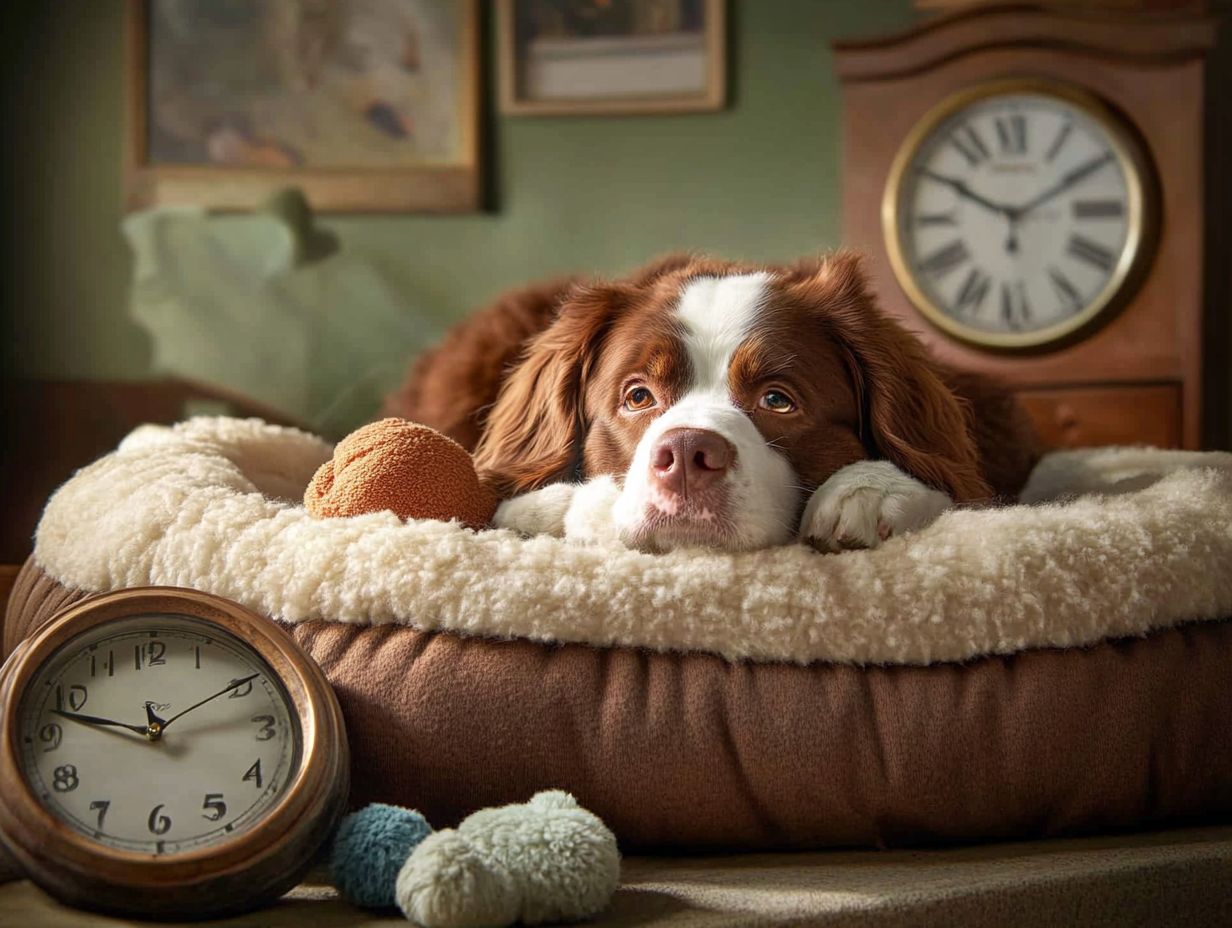
Routine provides structure and predictability for anxious pets, highlighting the importance of routine for anxious pets, which can help reduce their stress and anxiety levels.
What are some ways to establish a routine for an anxious pet?
Establishing a consistent daily schedule for activities such as feeding, playtime, and walks can help create a sense of routine for an anxious pet and enhance their overall mental health, as highlighted in the benefits of routine in pet environments.
Can a routine help with separation anxiety in pets?
Absolutely! A predictable routine helps your pet feel safe and secure. For pets with separation anxiety, learning how to foster a positive environment for anxious pets can help them become more comfortable being alone for short periods of time, ultimately supporting their emotional stability.
Will incorporating physical exercise into a routine benefit anxious pets?
Yes, regular physical exercise helps release endorphins and reduce anxiety in pets, making it an important part of their routine for mental and emotional health.
Can a routine help anxious pets with behavioral issues?
Establishing a routine can help reduce stress and promote better behavior in anxious pets. Understanding how important routine is for anxious pets can help them know what to expect and feel more secure in their environment.
Is it important to stick to a routine for anxious pets?
Consistency is key! Sticking to routines for anxious pets is crucial, as any disruptions can cause added stress and anxiety for them. Learning about the role of routine in training anxious pets can provide valuable insights.
Want to see your dog happier and calmer? Implementing these routines today can make all the difference!


